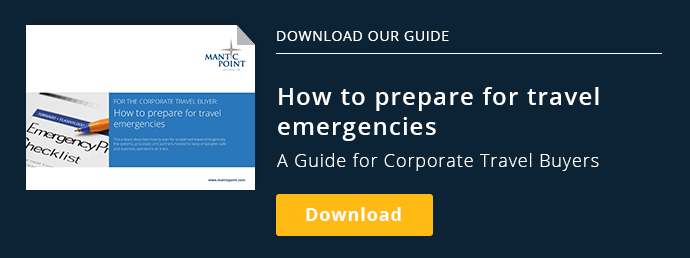How to Evolve your Travel Risk Management Processes
Posted by Mike Atherton on 07 November, 2017
Travel Risk Management Travel Apps Traveller Tracking Travel Risk Assessment

Even with the rise of virtual meetings online, business travel and face-to-face relationship building is still the core of a successful global business – but there are still risks to be considered. How can you evolve your travel risk management processes to keep business travellers safe?
Despite geopolitical tension and unprecedented levels of extreme weather, few organisations have fully-developed travel risk management processes. In fact, a GBTA survey found 46% of UK and USA business travellers work for firms with no clear travel security policies.
Even worse, the same survey revealed 22% of travellers wouldn’t even know who to contact in the event of an emergency whilst on a business trip.
At best, this simply shows ignorance, but at worst it shows a complete disregard for the duty-of-care all TMCs and corporate travel managers owe their travellers. Often organisations fail to take travel risk management seriously until an employee is affected by a serious incident – but this is too late!
Business travel is inherently risky because it places employees in unfamiliar and potentially dangerous environments. This makes understanding and mitigating travel risk extremely important for both business travellers and their employers.
At the very, least you should have clear travel risk management processes in place where everyone knows their role during a crisis event and has the tools they need to unfailingly deliver the very best support.
In this blog post we’ll show some examples of how you can fulfil your duty-of-care requirements, as well as ways you can evolve those processes:
Travel Risk Assessments
Why are these important?
Researching the risks involved with a business trip and communicating them to employees is a vital part of preparing travellers and an important aspect of travel management.
But performing a travel risk assessment isn’t just about identifying risk. It’s also an opportunity to educate travellers about best practices for staying safe and responding to hazardous situations.
What might these processes look like?
Before travellers leave ensure they have all the information required and are fully briefed as part of the company's travel policy. You should also provide them with a system to flag any questions they may have or need additional support they need to ensure they're safe and can meet the business goals of the trip.
How can I evolve my Travel Risk Assessment processes?
Ensure your travel risk partner can provide you with detailed, relevant research into the specific risks of travelling to a location and any risk factors based on a traveller's profile – using travel risk management software can help automate some steps of this lengthy process.
You should also ensure travellers have access to your business travel policy, which details the general risks of business travel and who they can contact in worst-case scenarios.
Travel risk assessments should be performed for every traveller, before every trip, and, if neccessary, followed up with a one-to-one meeting to ensure they’re well informed, confident about the trip and can address any worries they have.
Traveller Health Management
Why is this important?
Every business traveller has a unique medical history and every destination has unique medical risks, so no two business trips have the same risk profile. For each booking made, you need to have the relevant information toassess and report any specific health risks faced by the traveller.
What might these processes look like?
An email informing the traveller of health-risks commonly associated with their destination. Online tools can provide the traveller with information they need to stay healthy and safe, as well as reporting to see if they have read or watched the relevant information.
How can I evolve my Traveller Health Management processes?
Ensure traveller insurance is up-to-date and provide information on ways of preventing common health-risks, details of where to seek local medical attention and reminders to pack medication.
Traveller Security Management
Why is this important?
Widespread political unrest and subsequent terrorist activity, alongside a proliferation of extreme weather, has elevated threat levels across the globe. While this hasn’t hugely affected business travel, it’s vital you’re able to support travellers should an emergency occur.
What might these processes look like?
An email detailing any security risks of travelling to a destination and information about who to contact in the event of an emergency.
How can I evolve my Traveller Security Management processes?
Ensure your traveller has access to detailed on-demand risk information, including a destination’s risk factors, how to avoid exacerbating risks, and what to do should the worst happen. Utilise traveller tracking tools to pinpoint them in times of risk, secure check-in technology and access to a 24-hour crisis line.
Traveller Communication
Why is this important?
To give your business travellers the support they need, you also need to provide them with up-to-date travel information and timely responses to any queries.
What might these processes look like?
Provision of email address and phone number where travellers can contact you and auto-forwarding details of any emails your department receives concerning flight cancellation or delays.
How can I evolve my Traveller Communication processes?
Ensure all the details of current travel and accommodation arrangements can be found in one place, with push-notifications for flight cancellation and delays relevant to the traveller. Utilise live-chat that empowers you to communicate with travellers in real-time and a smart chatbot to handle queries out-of-hours.
Evolve Your Travel Risk Management Processes with Mantic Point
Like many aspects of the business travel industry, technology has proved to be revolutionary for risk management. Travel management software is making it easier than ever for TMCs and corporate travel managers to fulfil their duty-of-care, and it’s more cost-effective than ever for you to take your travel management mobile with your own travel itinerary app.
But evolving your Travel Risk Management strategy doesn’t need to mean starting from scratch or breaking the bank. It can simply be ensuring you perform a thorough and detailed Travel Risk Assessment for every traveller and every trip, or fully briefing travellers on best-practice in emergency situations.


